Custom Barrel Profiling
Beaulieu VineyardObjective
Synopsis
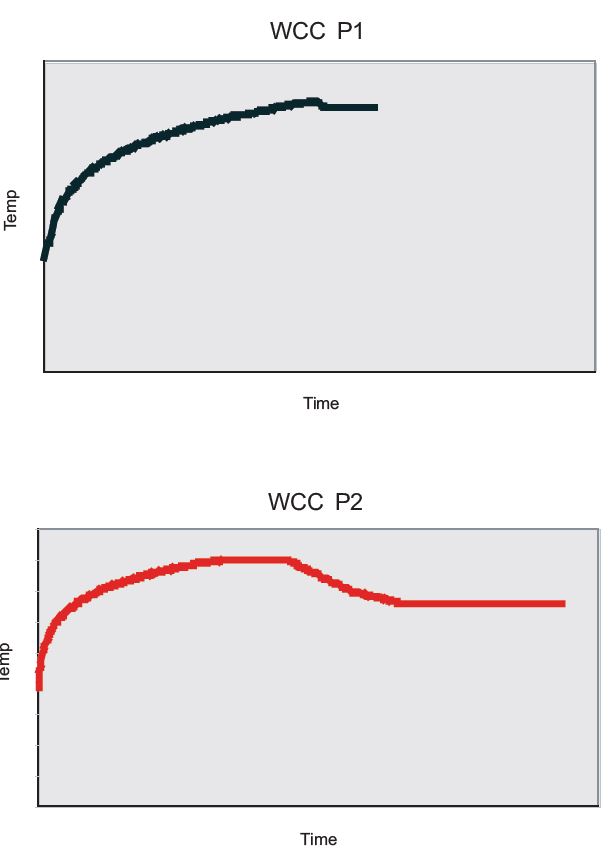
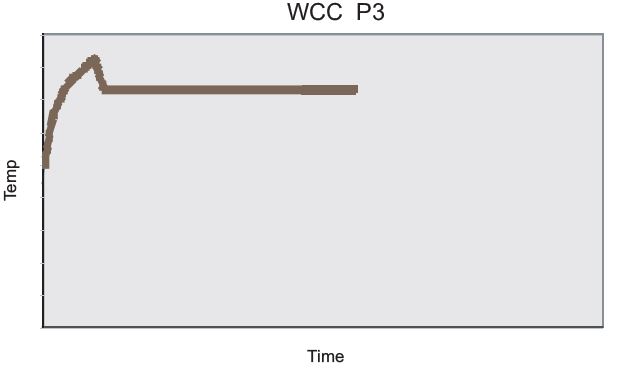
The Wine
Producer: Beaulieu Vineyard
Year: 2003
Variety: Chardonnay
Vineyard: Carneros
Crush Date: September 26, 2003
Harvest Data
- Total Acidity: 0.72 g/100 mL tartaric acid
- Brix: 24.8
- pH: 3.33
- Prior to fermenting added: 2#/1000
- Fermaid K, 3oz metabisulfite/ton
- Days of fermentation: 22
Fermented with: Ruby.ferm yeast
Wine Analysis as of May 5, 2004
- Alcohol: 14.50% volume
- Total Acidity: 0.44 g/100mL tartaric acid
- Volatile Acidity: 0.040 g/100 mL acetic acid
- Free Sulfur Dioxide: 29 mg/L SO2
- Total Sulfur Dioxide: 85 mg/L SO2
- pH: 3.64
- Residual Sugar: dry
Oak Data
Source: French oak
Wood Age: 24 months
Toast Level: Medium plus
Size: 59 gallons
trial execution
Sample Size: 4 of each variable
Oak Contact Time: 8 months
Bottling Date: May 2004
The Trial
WCC P1
WCC P2
WCC P3
World Cooperage Traditional
T.W. Boswell Legacy
T.W. Boswell Côte d’Or
RESULTS AND DISCUSSION
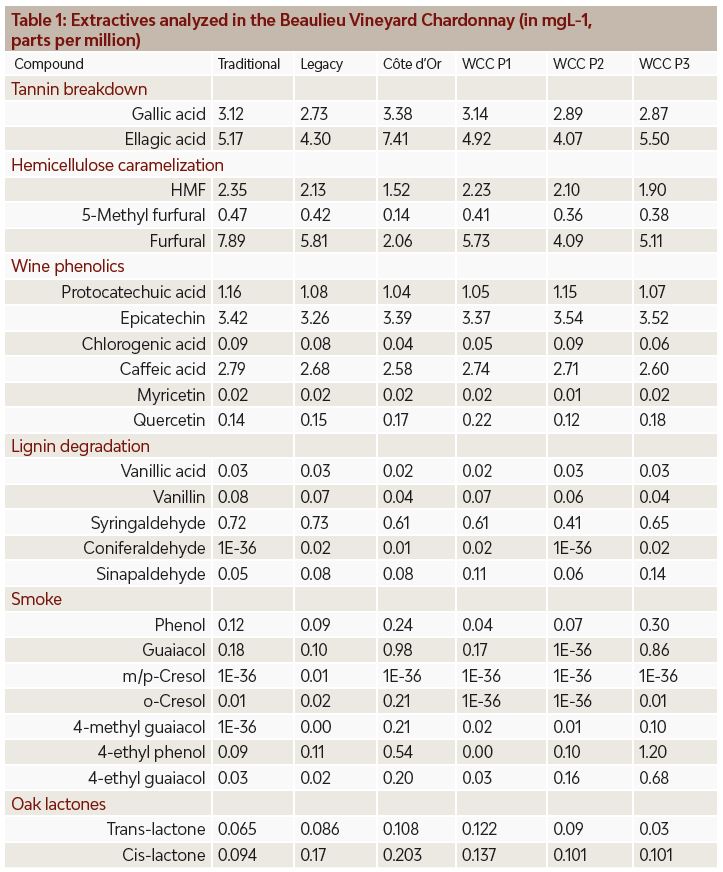
An overview showing the similarity between the barrels is shown in Figure 1.
Figure 1. 3-D overview of the similarity between the wine samples based on principal component analysis of the
chemical analysis
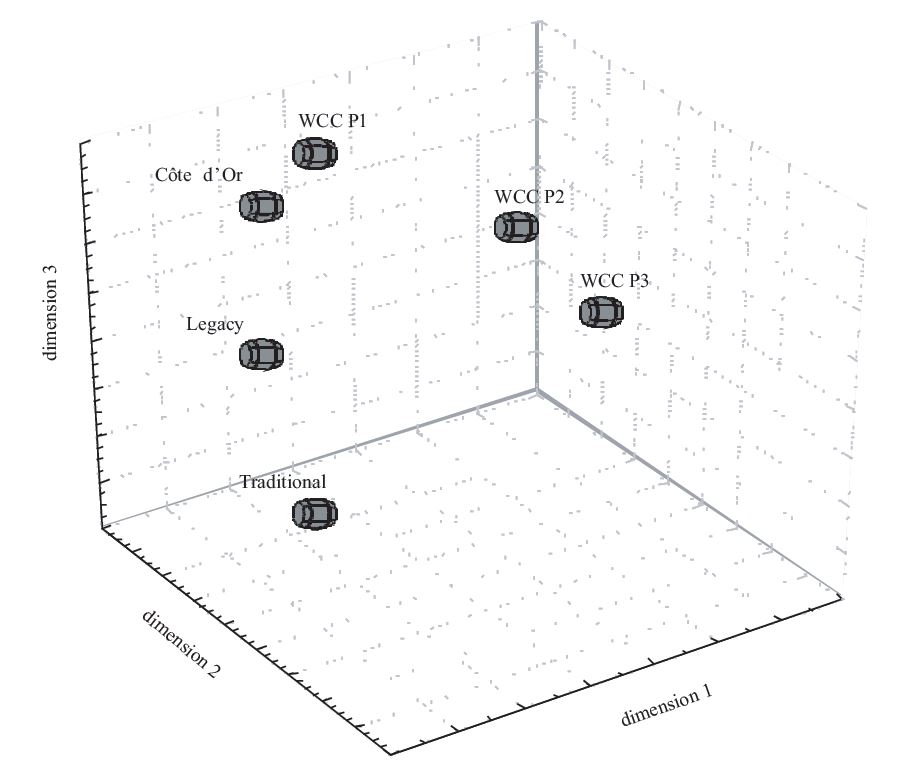
Figure 1 shows that the three new profiles are quite far removed (and therefore quite dissimilar) to the existing World Cooperage products.
Figure 2. Hmf and furfural in the Beaulieu Chardonnay, in parts per million
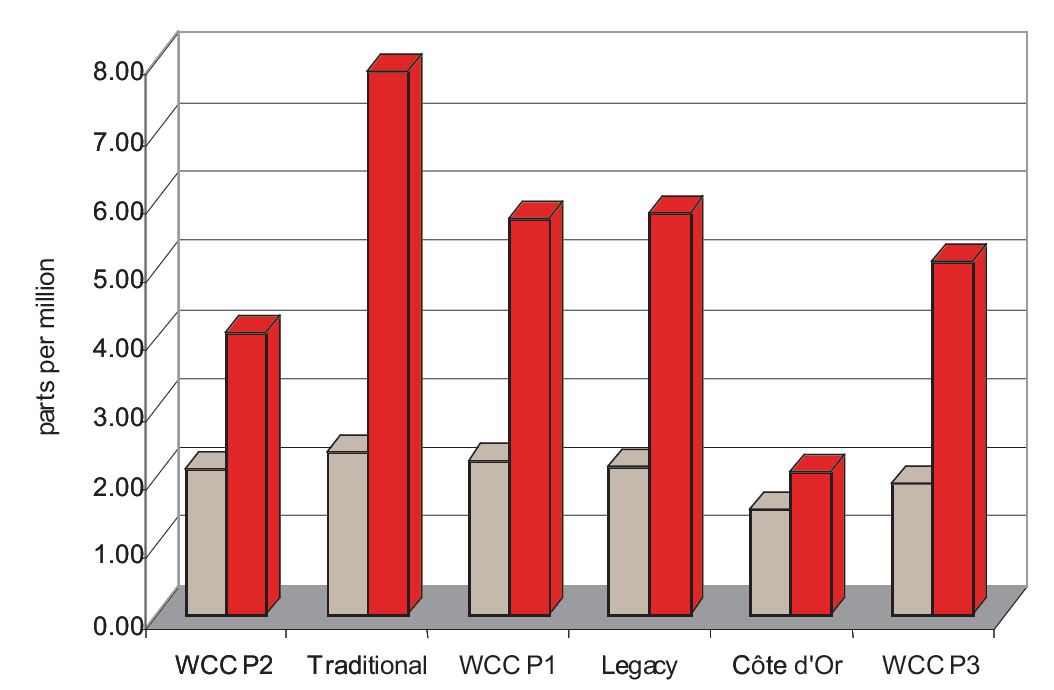
Toastiness in the wines from all of the barrels, as measured by Hmf (light creamy toffee) and furfural (burnt acrid toastiness), is shown in Figure 2. The bar chart shows that the Hmf level in the samples is very similar, only the Côte d’Or being a little lower. The World Cooperage Traditional toast barrel had the highest furfural level; this is true to type. Clearly all of these barrels created generous amounts of toastiness and all of the new special profiles were like the Legacy toast, particularly in respect to the Hmf content and relative amount of light creamy toast to dark heavy toastiness.
Figure 3 shows the ellagic acid content of the barrelled wines.
Figure 3. Ellagic acid in the Beaulieu Chardonnay samples (in parts per million)
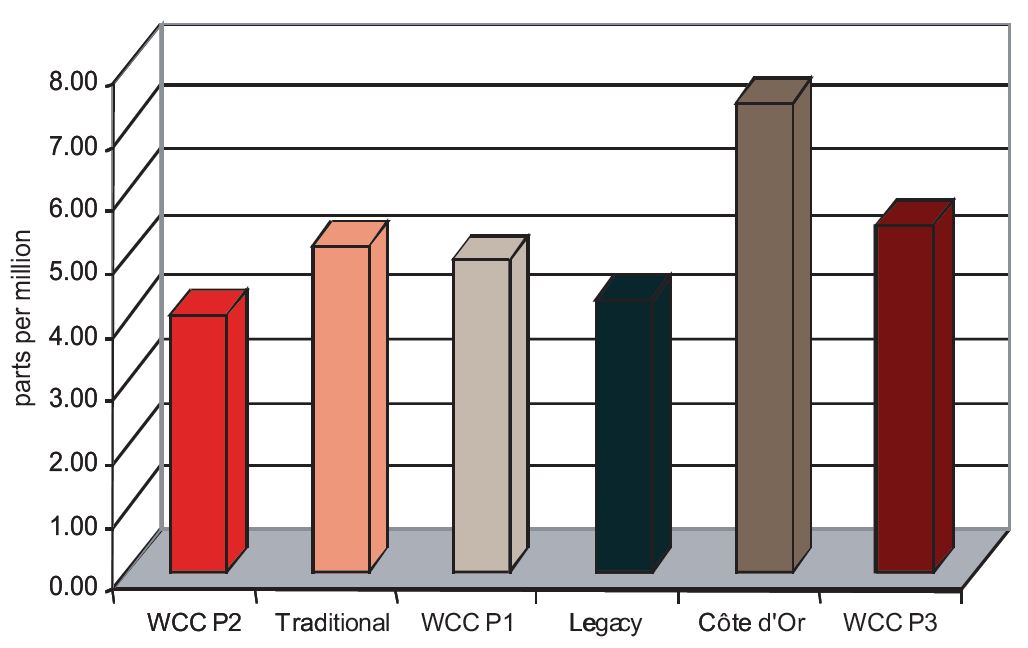
The results show that the water bent Profile WCC P1 has a little more tannin breakdown than its parent Legacy toast. However the highest level of tannin breakdown still occurs in the Côte d’Or, followed by WCC P3 which was subjected to more intense initial heating than any of the other products.
Figure 4 shows the vanillin content in the wines. Although there are trends that can be related back to the toasting process, all of the levels are very low, probably below threshold, and unlikely to influence flavor at this time. These wines were, of course, barrel fermented which does lead to assimilation of vanillin in the initial stages of barrelling.
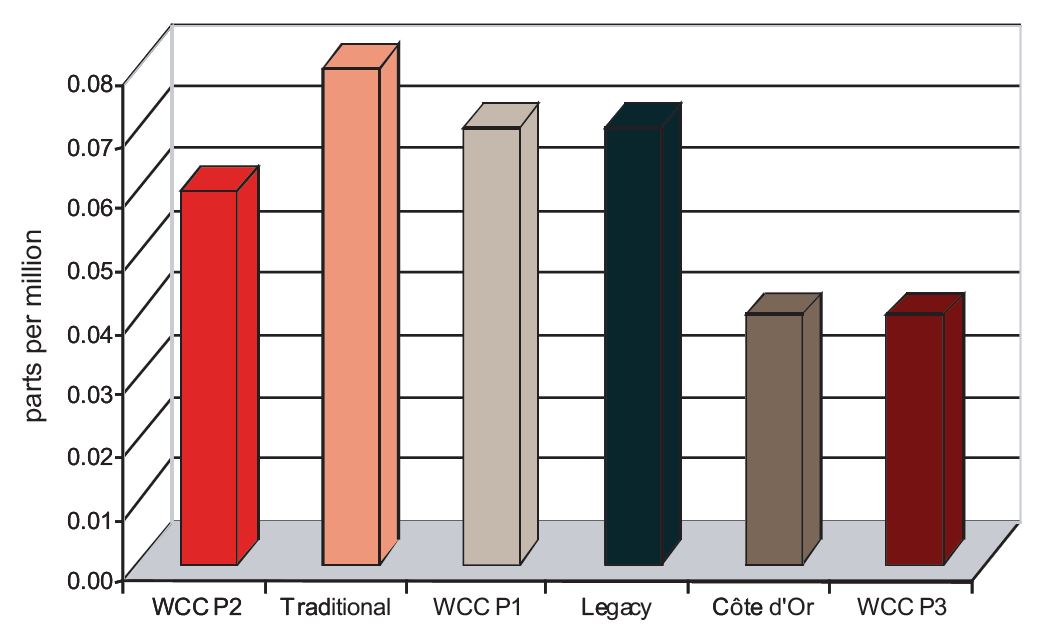
Figure 4. Vanillin in the Beaulieu Chardonnay samples (in parts per million)
Figure 5 shows the levels of guaiacol, a sweet-smoke aromatic that is often a feature of barrel matured Chardonnays. These results show a major difference between the Côte d’Or and the other barrel samples. The Côte d’Or and special toast WCC P3 are characterized by much more intense heat application during toasting. This manifests itself here in significantly higher sweet smoke character.
Figure 5. Guaiacol in Beaulieu Chardonnay samples (in parts per million)
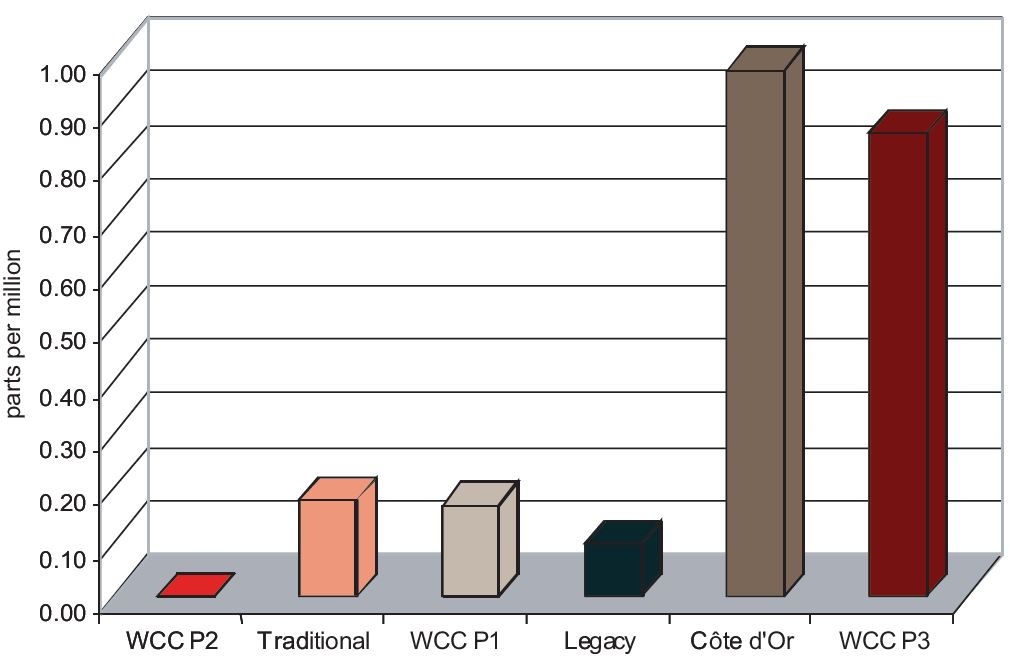
Spiciness as characterized by 4-methyl guaiacol is shown in Figure 6. Like the guaiacol smokiness, this compound is formed when sufficient heat is applied to break the oak lignin down beyond vanillin and related phenolic aldehydes. The effect is clearly demonstrated in
Figure 6. Figure 6. 4-methyl guaiacol (spice) in the Beaulieu barrel fermented Chardonnay samples (in parts per million)
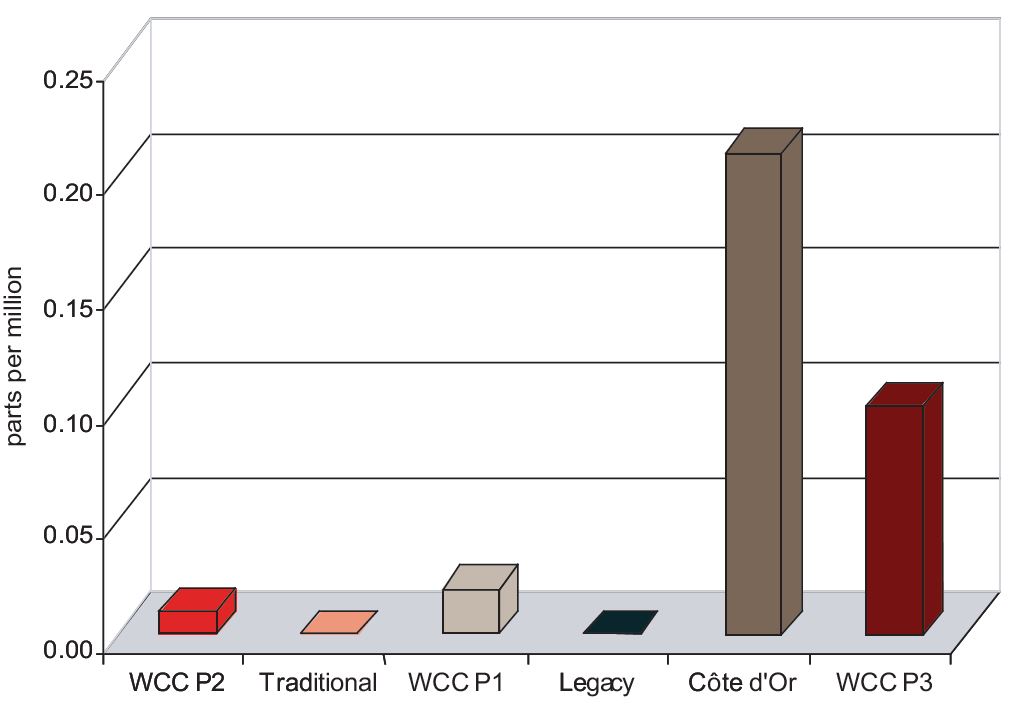
Conclusions
This experiment clearly demonstrates that special, tailor-made profiles can bring new features to a wine, offering a wide range of different products. In this case, they altered the flavor balance of the Beaulieu Chardonnay quite significantly.
tasting results
| Preferences | Total | ||
|---|---|---|---|
| 1st Choice | % | Count | |
| World Cooperage Traditional | 12% | 8 | 68 |
| T.W. Boswell Côte d’Or | 22% | 15 | 68 |
| T.W. Boswell Legacy | 13% | 9 | 68 |
| World Cooperage P1 | 24% | 16 | 68 |
| World Cooperage P2 | 15% | 10 | 68 |
| World Cooperage P3 | 15% | 10 | 68 |
| Preferences | Total | ||
|---|---|---|---|
| 2nd Choice | % | Count | |
| World Cooperage Traditional | 21% | 16 | 76 |
| T.W. Boswell Côte d’Or | 22% | 19 | 76 |
| T.W. Boswell Legacy | 17% | 13 | 76 |
| World Cooperage P1 | 22% | 17 | 76 |
| World Cooperage P2 | 7% | 5 | 76 |
| World Cooperage P3 | 8% | 6 | 76 |
| Preferences | Total | ||
|---|---|---|---|
| Last Choice | % | Count | |
| World Cooperage Traditional | 15% | 12 | 81 |
| T.W. Boswell Côte d’Or | 11% | 9 | 81 |
| T.W. Boswell Legacy | 9% | 7 | 81 |
| World Cooperage P1 | 10% | 8 | 81 |
| World Cooperage P2 | 17% | 14 | 81 |
| World Cooperage P3 | 38% | 31 | 81 |
